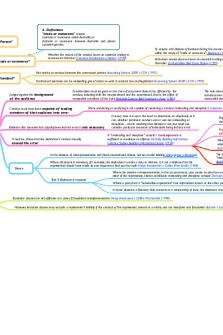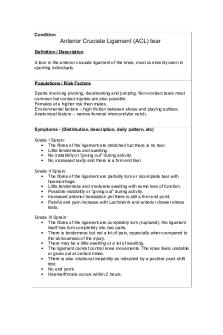ACL Exam- Cases PDF

| Title | ACL Exam- Cases |
|---|---|
| Author | Jasmine Neal |
| Course | Applied Company Law |
| Institution | University of Technology Sydney |
| Pages | 5 |
| File Size | 149.2 KB |
| File Type | |
| Total Downloads | 87 |
| Total Views | 144 |
Summary
ACL Exam- Cases...
Description
CASES Furs v Tomkies Asic v Vizard Mcgellin • • •
Court in McLellan, in the matter of The Stake Man Pty Ltd v Carroll [2009] FCA 1415 Director excused from liability for insolvent trading for payment of $356,952.02 Significance: first case where a director has been fully excused from personal liability through the exercise of judicial discretion under ss 1317S
Asic v Healey Parke v Daily News- director pay out employees when a company being sold Russell kinselaHarvard smith and ampol White house and carlton- issuing shares to dilute ex-wife’s ownership Mills v mills Deputy Commissioner of Taxation v Clark ASIC v Macdonald (2009) 1. Personal/secret profits or commissions arising from acting as director obtaining undisclosed benefits (Furs Ltd v Tomkies (1936) 54 CLR 583) 2. Taking up corporate opportunity (Qld Mines v Hudson (1978) 52 ALJR 399; Cook v Deeks [1916] 1 AC 554) 3. Using confidential information/competing with co (Green v Bestobell Industries Ltd (1982) WAR 1) 1. 2. 3. 4.
Furs Ltd v Tomkies (1936) 54 CLR 583 Cook v Deeks [1916] 1 AC 554) Qld Mines v Hudson (1978) 52 ALJR 399 Green v Bestobell Industries Ltd (1982) WAR 1
Green v vestail Cook V Deeks Canadian Aero v O Malley Qld Hudson V Mines Dct v Clarke statewide tobacco and morely powell v fryer- cash flow test Asic v plymin- 14 factors (apply it to the facts)
1. James Hardie Case (ASIC v Macdonald (No 11)(2009) 256 ALR 199; Morley v ASIC [2010] NSWCA 331; ASIC v Hellicar [2012]; Shafron v ASIC [2012]; Gillfillan v ASIC [2012] NSWCA 370 )
Commonly regarded indicators of insolvency established in: ASIC v Plymin (2003) 46 ACSR 126 • Continuing losses • Liquidity ratio below 1.0 • Creditors unpaid outside trading terms • Overdue Commonwealth & State taxes and Statutory obligations • Poor relationship with present bank including inability to borrow additional funds • No access to alternative finance • Inability to raise further equity capital • Issuing of post-dated cheques / dishonoured cheques • Solicitors’ letters, summons(es), judgments or warrants issued against the company (i.e. legal/ enforcement action to recover debts) • Inability to produce timely and accurate financial information to display the company’s trading performance and financial position, and make reliable forecasts.
Ebrahimi v Westbourne Galleries Ltd
Re Spanish Prospecting Co Ltd [1911] 1 Ch 92 (CA): “‘Profits’ implies a comparison between the state of a business at two specific dates usually separated by an interval of a year. The fundamental meaning is the amount of gain made by the business during the year. This can only be ascertained by a comparison of the assets of the business at the two dates.”
James Hardie Case JHI transferred assets to its MRCF trust and stated it was fully funded, had sufficient funds to meet legitimate compensation claims State the funds provided certainty for claimants and shareholders. Said they sought expert advice and James Hardie is satisfied they have sufficient finds to meet anticipated future claims In 2003 liability estimates were reported at $1.573 billion OUTCOME: ASIC sued directors and various officers in court alleging they breached their statutory duty of care and due diligence by contravening disclosure obligations. Focus was o n the ASX media release. Court found the directors and NEDs breached their duty o directors must review board documents carefully (not reading board papers, or not reading them with sufficient care is not a defence) o Directors should not rely on the words of managers and advisors = must make own enquiries Daniels v Anderson (“AWA Case”) Mr Coval racked up losses of $60B – directors were unaware OUTCOME o NEDs=Ed – exact same standard of care, skill and diligence expected o Directors are under a continuing obligation to keep informed about the activities of a corporation o Directors may not shut their eyes to corporate misconduct and then claim that because they did not see the misconduct, they did not have a duty to look o Duty to keep informed of business affairs
ASIC v Healey (“Centro case”) Directors failing to comply with their duty of care and diligence under s180(1) by allowing the company to release its 2007 financial reports with over $1 billion in current debt mischaracterised as a non-current liability OUTCOME: Judge of the federal court upheld ASIC’s claim that the directors and CFO breached s180(1). Directors did not take all reasonable steps to secure compliance with s295A. Penalty included fines, disqualification from managing and applications for relief of liability being denied. o Directors must have basic skill in relation to financial statements and financial affairs of the company Directors duties = • a [basic] understanding of the business • Keep informed about the activities of the corporation • monitor the corporate affairs and policies • maintain familiarity with financial status of the corporation by a regular review and understanding of financial statements • directors should have a questioning mind (not required to be an auditor) Furs v Tomkies...
Similar Free PDFs

ACL Exam- Cases
- 5 Pages

ACL Alternative Final Exam
- 4 Pages

S 18 ACL - S18 ACL
- 1 Pages

ACL Notes
- 4 Pages

Exam Prep - Cases
- 6 Pages

LAPORAN PENDAHULUAN RUPTUR ACL
- 9 Pages

Torts exam- cases and legislation
- 24 Pages

Civil Procedure Final Exam - Cases
- 11 Pages

Contract Law Exam Key Cases
- 2 Pages

Final Exam Cases - Summary Torts
- 7 Pages

Exam Note - CANON Cases study
- 5 Pages

KNEE-ACL-tear
- 3 Pages

35 ACL - dsvsd
- 10 Pages

Cases
- 3 Pages

ACL framework overview
- 22 Pages

Cases
- 6 Pages
Popular Institutions
- Tinajero National High School - Annex
- Politeknik Caltex Riau
- Yokohama City University
- SGT University
- University of Al-Qadisiyah
- Divine Word College of Vigan
- Techniek College Rotterdam
- Universidade de Santiago
- Universiti Teknologi MARA Cawangan Johor Kampus Pasir Gudang
- Poltekkes Kemenkes Yogyakarta
- Baguio City National High School
- Colegio san marcos
- preparatoria uno
- Centro de Bachillerato Tecnológico Industrial y de Servicios No. 107
- Dalian Maritime University
- Quang Trung Secondary School
- Colegio Tecnológico en Informática
- Corporación Regional de Educación Superior
- Grupo CEDVA
- Dar Al Uloom University
- Centro de Estudios Preuniversitarios de la Universidad Nacional de Ingeniería
- 上智大学
- Aakash International School, Nuna Majara
- San Felipe Neri Catholic School
- Kang Chiao International School - New Taipei City
- Misamis Occidental National High School
- Institución Educativa Escuela Normal Juan Ladrilleros
- Kolehiyo ng Pantukan
- Batanes State College
- Instituto Continental
- Sekolah Menengah Kejuruan Kesehatan Kaltara (Tarakan)
- Colegio de La Inmaculada Concepcion - Cebu